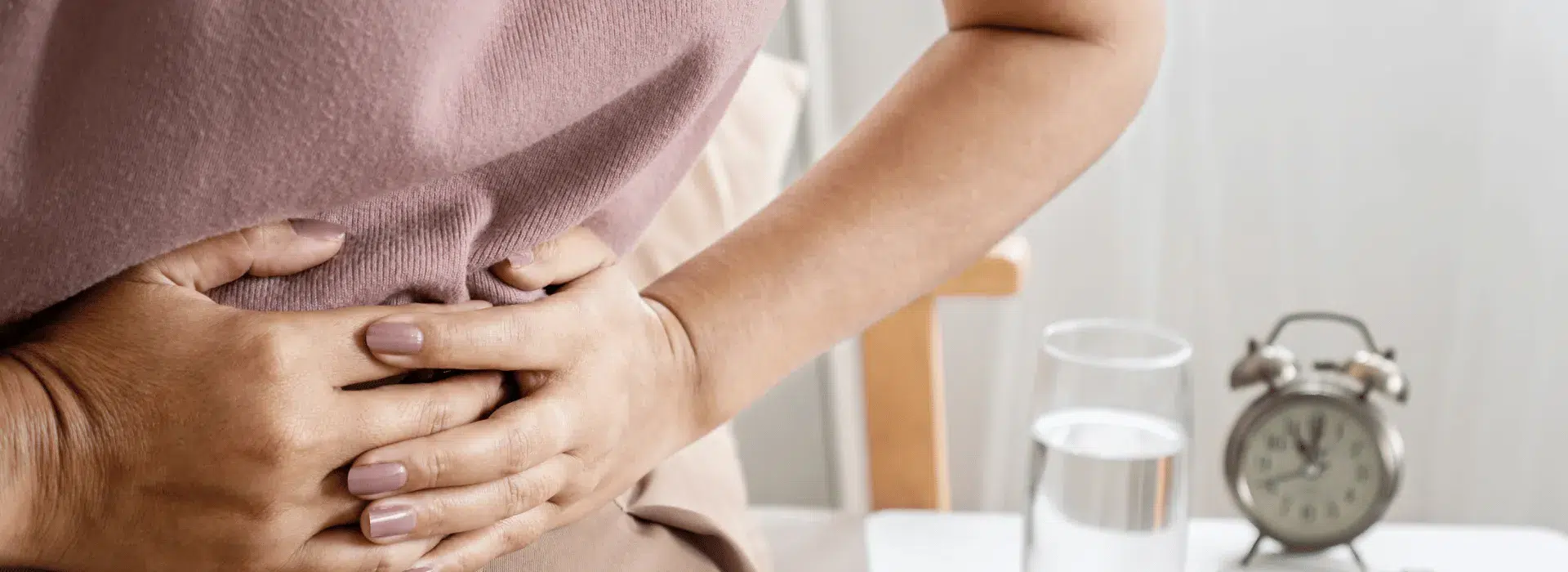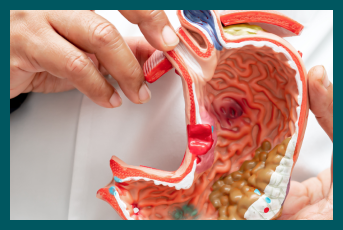What are the symptoms of an IBS flare-up? A doctor’s guide
Written by the editorial staff writer at Hola. Medically Reviewed by Dr. Ammar ADL-ANI, MBChB, CCBST, AMC. Blog updated on 04 November, 2025. Originally published on 24 May, 2024.

Contents

What is Irritable Bowel Syndrome (IBS)?
Irritable Bowel Syndrome (IBS) is one of the most common gut conditions in Australia, affecting around 1 in 5 people1. It causes pain, bloating, and changes in bowel habits (diarrhoea, constipation or both). The exact cause is unclear, but it’s linked to diet, stress, gut bacteria, and intestinal sensitivity.Symptoms
Here are some common symptoms you’re likely to notice during an IBS flare-up:Common symptoms:
- Abdominal cramps or pain, which usually settle down after going to the loo or releasing gas.
- Bloating or feeling full
- Diarrhoea or constipation, sometimes alternating between both.
- Urgency (needing to go quickly) or the feeling that your bowels haven’t fully cleared.
Additional symptoms:
- Mucus in the stool
- A feeling of incomplete evacuation (this can sometimes be a sign of bowel or rectal cancer, so make sure you discuss this with your doctor if you have this symptom).
- Feeling uncomfortable after eating meals, sometimes with gas or mild nausea (not always).
IBS triggers
Everyone’s triggers are different, but these are the ones many Australians report. Identifying your triggers can help make flare-ups easier to manage.Food triggers:
- High-FODMAP foods (short-chain carbohydrates that aren’t well absorbed) – Monash University’s low-FODMAP diet2 is quite beneficial here.
- Dairy products, especially milk, ice cream, or cheese, may be problematic for individuals with lactose intolerance.
- Alcohol, caffeine, or fizzy drinks
- Processed or fatty foods, too much onion, garlic, legumes, if high in FODMAPs
Lifestyle and stress triggers:
- Stress and anxiety
- Changes in routine (travel, sleeping pattern changes, or shift work)
- Lack of physical activity
Hormonal or medical triggers:
- Menstrual cycle, many women report worsened IBS symptoms during their periods.
- Gastro infections, other illnesses, some medications, including antibiotics or pain-relief medicines.
What does a severe IBS flare-up feel like?
A severe IBS attack can cause intense abdominal pain and cramping, making it difficult to focus on daily activities. Some individuals experience urgent diarrhoea or prolonged constipation, leading to discomfort and distress. Severe IBS can mimic other gastrointestinal conditions, so consult a GP if unsure.Tips for managing
When IBS symptoms flare up, a few simple lifestyle tweaks can help you feel more in control. Some people find relief quickly, while others may benefit from additional guidance from a doctor or a dietician. Additionally, telehealth is a great option for both. Here are a few simple everyday tips:- Keeping a food and symptom diary to identify triggers. Some Aussies use the Monash FODMAP App to help spot food triggers.
- Try the low-FODMAP diet. The Monash University Low-FODMAP Diet, developed in Australia, is one of the most research-backed ways to manage IBS. Many people feel better within weeks.
- Speak with a dietician. Your GP can refer you to an Accredited Practising Dietitian under a Chronic Disease Management Plan, which may be bulk-billed under Medicare. Many dietitians now offer telehealth appointments, so you can get specialist guidance from home.
- Get active. Go for a short walk, do light exercise, or try yoga to ease bloating and encourage bowel movement.
- Stay hydrated, especially if diarrhoea is part of your flare-up. Keep a water bottle handy, take small sips of water or oral rehydration if you feel drained.
- Eating smaller, more frequent meals, as large meals can trigger symptoms.
- Manage your stress. IBS often worsens when stress levels are high. Take short breaks, breathe slowly, or use a meditation app; even 10 minutes daily can help.
- Get enough sleep. Poor sleep can aggravate IBS symptoms. Try to keep a consistent sleep routine, even on weekends.
Feeling sick and unsure why? Speak with a GP online in 15 minutes.
How do you calm an IBS flare-up?
Flare-ups can feel intense, but small, simple actions can help calm your digestive system and ease the discomfort.Quick tips to calm an IBS flare-up:
- Use a warm heat pack or wheat bag from the chemist for abdominal cramps. Don’t overuse heat packs, as they can leave marks on your skin.
- Try ginger or peppermint, unless they trigger your symptoms.
- Avoid lying down after eating.
- If needed, ask your GP about safe over-the-counter options.
What should I eat during an IBS flare-up?
A bland diet can help ease symptoms during an IBS flare-up. Here are some safe bets that are easy to find at Aussie supermarkets like Coles or Woolworths:Foods that are easy on the gut:
- Plain rice or potatoes
- Lean meats: plain chicken or fish
- Orzo or quinoa
- Bananas (ripe but not overripe)
- Cooked vegetables, such as carrots or zucchini
- Lactose-free dairy alternatives
What to avoid:
- High-FODMAP foods like garlic, onions, or beans
- Spicy, fatty foods
- Larger portions—smaller, more frequent meals may help
- Excess caffeine or alcohol
Can I prevent IBS flare-ups?
While IBS cannot be cured, symptoms can often be minimised with consistent management strategies. The key is being consistent, paying attention to your body, and getting professional help if things aren’t improving.- Stick to a routine. Try to eat, sleep, and move at roughly the same times each day. Your gut likes a predictable schedule.
- Don’t skip meals. A long gap between meals or overeating may disrupt your gut.
- Reintroduce food gradually. If you’ve been following the Monash University Low-FODMAP diet, consult a dietitian to reintroduce foods slowly; your gut may handle more than you think.
- Identify and avoid known triggers.
- Stay physically fit and active to support gut health and reduce bloating.
Consult a GP
See a GP if:- Symptoms persist for weeks despite trying changes (diet, stress management).
- IBS flare-ups are disrupting your daily life, work, study, or sleep.
- You have a fever or notice symptoms that are different from your usual flare-ups
- You’re unsure about your triggers and need professional help.
- Extremely severe stomach pain (sudden, intense)
- You experience signs of dehydration
- You’re vomiting blood
- You notice blood in your stool or bowel motions that appear very dark or black.
- You’re losing weight without trying or feel exhausted.
How Hola Health Can Help
Living with IBS can be unpredictable, but getting the right support doesn’t have to be difficult. With Hola Health’s online GP consultations, you can connect with experienced Australian doctors from the comfort of your home — no waiting rooms or travel needed.
Our telehealth doctors can:
-
Assess your symptoms and help rule out other digestive issues that may mimic IBS.
-
Provide tailored treatment advice, including dietary adjustments, stress management tips, and medication guidance.
-
Issue eScripts instantly for medications or supplements if needed.
-
Refer you to a dietitian or specialist for ongoing support under a Chronic Disease Management Plan (often bulk billed).
-
Offer follow-up care to help you track progress and reduce the frequency of flare-ups.
Whether you’re experiencing a flare-up or want to better manage your gut health long term, Hola Health makes it simple to book an telehealth appointment anytime, anywhere in Australia.
Conclusion
IBS flare-ups can be frustrating, but knowing your triggers and managing flare-ups makes a big difference. If symptoms are ongoing or severe, check in with your GP. For fast, accessible support, you can book a telehealth consultation with Hola Health today.FAQs
What is the biggest trigger for IBS?
Dietary triggers, particularly high-FODMAP foods, are among the most common causes of IBS flare-ups. Stress and hormonal changes can also play a significant role.What are the types of IBS?
IBS is classified into different types based on predominant symptoms:- IBS-D (diarrhoea-predominant)
- IBS-C (constipation-predominant)
- IBS-M (mixed, alternating between diarrhoea and constipation)
- IBS-U (unclassified)
How long does it take for IBS flare-ups to go away?
Flare-ups can last anywhere from a few hours to several days, depending on the severity and management strategies used.Can you relieve IBS pain instantly?
While there is no instant cure, applying heat, drinking herbal tea, practising relaxation techniques, and taking prescribed medications can help alleviate discomfort quickly.Can OBS be mistaken for another gut disease?
Yes. Conditions like coeliac disease, inflammatory bowel disease (IBD), or even infections can have similar symptoms. A GP will usually check for warning signs and may order tests to rule these out.How common is IBS in Australia?
IBS affects around 1 in 5 Australians. It’s a common diagnosis in primary care.15 minutes, anytime, anywhere.
Reference
- Irritable bowel syndrome - reference link
- Monash University - reference link
What we treat
- Cough
- Nausea & vomiting
- Fever
- Hayfever
- Fatigue
- Sore throat
- Acne
- Hair loss
- Gout
- Eczema
- Rosacea
- Sunburn
- UTI
- Erectile dysfunction
- Contraception
- Morning sickness
- Morning after pill
- Prostate health
- Anxiety
- Depression
- Stress
- Grief & loss
- Antidepressants
- Premature ejaculation
- Asthma
- Blood pressure
- Blood thinners
- Diabetes
- Cholesterol
- Migraines & headaches
- Allergies
- Body ache
- Heartburn & reflux
- Sleep disorder
- Pain relief
- Gastro
Related Articles
Disclaimer
This blog is for general informational purposes only and does not indicate that Hola Health provides all treatments or preventive measures mentioned. It is not intended to be a substitute for professional medical advice. Always seek the guidance of your doctor or other qualified health professional with any questions you may have regarding your health or a medical condition. For emergencies please immediately contact 000. Any medical topics discussed are intended to educate, not to imply availability through Hola Health.
 Facebook
Facebook  X
X  Copy Link
Copy Link



